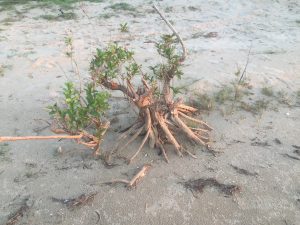
Academia’s Outer Limits (Michael O’Rourke)
 Recently I have spent a great deal of time thinking about the name we might give, however provisionally, to those who work at the furthermost reaches of the academic institution.
Recently I have spent a great deal of time thinking about the name we might give, however provisionally, to those who work at the furthermost reaches of the academic institution.
For a long time I had adopted the term para-academia, and this term continues to do productive and unsettling work for many people. However, the fact that it was coined by a tenured academic and that it has been claimed and adopted by academics to describe their work gives me great pause.
After all, wasn’t para-academia really meant to refer to the largely unremunerated work done by those precariously positioned outwith the academic institution, labor undertaken largely out of sheer love for ideas and the dissemination of knowledge? Once it was being co-opted by tenured academics para-academia seemed to me to have ceded much of its descriptive force and become a proper word or proper name in the cosy domain of academic knowledge production.
As an alternative I have been suggesting we take on the name peri-academia, a word which I believe better encapsulates the edge-work that those situated outside the institution and its walls undertake. Peri – has connotations of nearness, proximity and crowding around which are indeed useful to think with. Additionally, peri-academia has the virtue of flagging how there are hierarchies even within the ranks of para-academia.
There are striations and gradations running from the adjunct to the drop out which need to be carefully and cautiously mapped (it is all too easy for tenured academics to talk about precarity and unremunerated labor while doing absolutely nothing to support or make alliances with the peri-carious (another concept I have proposed which indexes that even within precarity there are many layers and strata).
To my surprise and maybe even a little dismay the word peri-academic has started to gain traction and has been taken up by a number of figures who agree with me that we need better grammars and nomenclatures for the educational undercommons.
I do like this word (and its companion peri-carious) and I will continue to deploy it. But, restlessly, I have been toying (and I hope this word doesn’t deflate the sense of urgency or importance attending this conversation about naming) with other improper names.
One which came to me a short while ago (upon re-reading Derrida’s Aporias) is poro-academia. This prefix seems to me to have some valuable differences from para– and peri-.
The poro– has connotations of porosity and how the disenfranchised are able to penetrate into the institution (rather than just para-sitizing on it or being in propinquity to it). The poro- has all kinds of anarchic potential too, conjuring up as it does smuggling, invagination, interruption, seepage, fluidity. And porosity flows both ways and blurs the lines of demarcation between inside/outside, proper/improper and so on. Poro-academic as a term can perform valuable and productively destabilizing and ruinous work.
But the new name I want to propose, no less tentatively than the other two neologisms I’ve been mobilizing, is pas-cademia. The word imposed itself upon me, arrived unexpectedly, as I was reading Derrida’s Parages, a disparate collection of texts on Maurice Blanchot.
Immediately the title of Derrida’s book got me to thinking about the disparaged, those who have no place, do not belong to the institution, who “draw near it even if they have to give up getting there”.
They may belong at times (parfois in Derrida’s French) but this temporary belonging (appartenance) always makes them feel illegitimate. The vagabond academic in her illegitimacy must smuggle ideas in and back out, a trafficking in illegal contraband.
“How are we to legitimate these names?” Derrida wonders at the beginning of his introduction to Parages and this is the question which has spurred many of my own disparate reflections on parti(cipa)tion and partage, the way the spaces and times of learning are distributed, apportioned, parcelled out, weighed, measured, shared.
And Derrida answers his own question by avowing that the work of legitimation “requires some new and rigorous distinctions, a complete redistribution of spaces”. (2) In legitimating the new name pas-cademia (which is really plural, a bundle of names) I wish to interrogate the distribution of space(s) to those who are situated improperly, obliquely, without authority, without power, who are considered to transgress or infringe upon the rule or law of institutionality with all its attendant rules to do with competencies and accreditations.
There are, as I already mentioned, massive disparities and disproportionalities between the institutionally proper and the disparaged, those dissembling “dissociable bodies, apart and disparate” (3) who take it upon themselves to “have it out with the academic institution” (4). Each of them “parti(cipates)tions itself otherwise. Whence its isolation, let’s say rather its insularity” (6).
While the survival (and the very livability) of the pas-cademic is often isolating, lonely and insular there are still surprising modes of sociability and co-poiesis, as those on the outer edges, the borders, brinks and shores try to craft more habitable (if temporary) zones for knowledge producing and dispensing. What is in operation here is a “double motion of approach and distance” (6), an “incalculable topology” (8) as the pas-cademic is both near (in the vicinity of) and far from the walls of the university.
From this position of being lost (perdue), drowned, abandoned, at sea (parages can mean waters as well as parts) the anarchically (parage contains rage) ungovernable can fashion their own perdurable structures of knowledge-making which are immeasurable (scandalously so when it comes to the auditory logic of the university), contaminatory and unindebted (gifts in an aneconomy of ideas).
The pas-cademic is never islanded completely, is never alone, just as parages contains so many other words: “In truth the name is never alone … the occurrence of each vocable would come to cross [croiser], in these parts, in these waters, both chance and necessity: brief glimmer, abbreviation of a signature hardly sketched, immediately effaced, a name of which one no longer knows to whom it comes back, to what author or to what tongue, to one or the other” (8).
One never owns a term (as para-academia has been claimed by its owner) or an idea in the pas-cademy. On the contrary the pas-cademy depends on a kleptocratic theft and sharing of ideas, knowledge, spaces. She escapes and she drifts, is without home or tenure, incapable of being held on to as she freely gives away and tries to hold on.
Pas-cademia “ proceeds here from no authority, no law, no hierarchy” (15) and the here of the pas-cademy is “what I call, provisionally, la demarche d’un pas, the (dis)approach of a no/place” (17). That here is atopic or heterotopic in Foucauldian terms as “the near be-comes far, when the near comes-from afar” (17) in what Derrida calls a “de-distancing”. With her comings and goings she is “free in her movement” (18) and passes wherever she wishes without academic passport.
Her movement is unarraignable by any law, her “passage of a coming-and-going” is one “where the origin of the movement, action, sign, or word never lets itself be arrested, assigned” (18). The prefix pas should not be understood as a negative. Rather it refers to the play in Derrida and Blanchot between step/pace and not. The no-p(l)ace of the pas-cademic is non-presentable:“in proximity, touching not [non pas] presence, but rather difference” (22).
Derrida is clear in saying that “this pas, this no/pace, is not [pas] even divided by a self-negation or self-denegation” (20) And “since it will never be present to itself, close by self” (20) then it cannot be grasped or (re)appropriated (Pas de réappropriation: (non)pace of (no) reappropriation (20)). The term itself (as with all the other improper names) is provisional, infinitely re-placeable, discreetly twisted, slyly re-employed.
In the pas-cademy we might employ the term dis-junct rather than adjunct because “the mode of disjunction parts [s’écarte] from simple opposition, as well as from hierarchy” (24) and “the disjunct of the near and the present produces, engenders, and reveals at once a fissure without limit” (24).
In this lawless law of de-distancing and “dis-approach” (26) there emerges “a fissure that still holds together”. This gap, this dis-location (of near and far) is se-reparative, “separates without separating, keeps up without keeping together” (26). “In its double pas (pace, not), the other dislocates the opposition of the near and the far, without however confusing them” (26) and this double band (contre-band) is what makes space for over-stepping, transgressing, interrupting, infiltrating, parasitizing, intruding over and beyond the line. But the pas-cademic could never become an identity, it can only ever disjoin the identitarian. From with-out she “disarticulates every logic of identity” (34).
Pas-cademia is “the no name”, an anonymous, improper name (67), “the (non)pace of the name” (56) because “nothing nor anyone has arrived that can be named already or receive a name” (59). This not-quite-a-name is “pas de concept, the (non)pace of (no) concept” (60). In the double band/bind, a doubling and re-doubling of that which can never be presented we have the non-ontology of the pas-cademic.
The pas-cademic commits faux-pas after faux-pas, but she must (il faut) necessarily err. In her destinerrant comings-and-goings, her de-portings, she renounces “ the right of property/propriety as well as the lesson, teaching” (50) and from her posture of insecurity “puts one on guard against all the securities of anchorage, shoreline, riveting, property, propriety” (53).
She veers away from a certain order, withdraws from, re-draws the lines of, tampers with the law. But there is “no/pace of negativity in this withdrawal” (78). Rather, “the not [ne pas] does not cause the negation to bear on a position or a negation but on the singular undecidability of the approach of the other: not able to go either farther or closer…The pace/not toward the other (no/pace of de-distancing) does not find its place there or rather does not admit of finding its place there” (83). It does not admit its admissions.
Its passages, moments, movements, upsurgings are discreet and silent yet forceful. Derrida calls her ungraspable motion at the seemingly impregnable margins “movimentum” (64).
This movimentum of the pas-cademic may be discreet, indistinct, silent, undecidable but something is happening, ad-vening, arriving, e-venting, coming. The disruption is the very promise of the à-venir, an event at/of the border, margin, edge, limit, aporia. The aporetic may call to mind impossibility, impassability, difficulty, impracticability, non-passage whilst the poros is suggestive of a passageway, the opening of a passage, the invention of new steps, previously unimaginable or uninvented choreographies[ii].
The pas-cademic follows along the difficult contours of the aporetic, endures with and works it. This is why Derrida emphasizes aporias in the plural: “A plural logic of the aporia thus takes shape where we try to think the logic of partition and partage: “It appears to be paradoxical enough so that the partitioning [partage] among multiple figures of the aporia does not oppose figures to each other, but instead installs the haunting of the one in the other. In one case, the nonpassage resembles an impermeability; it would stem from the opaque existence of an uncrossable border: a door that does not open or that only opens according to an unlocatable condition, according to the inaccessible secret of some shibboleth” (20).
The logic of impermeability is itself contaminated, haunted by the peri/poro/pera: “For this pas involves the line that terminates all determination, the final or definitional line—peras this time rather than telos. And peras is precisely what Cicero could also have translated by finis. The Greek word peras—term, end or limit, extremity—puts us also on the path of peran, which means “beyond”, on the other side, and even vis-à-vis. It also puts us on the path of peraō: I penetrate …I traverse by penetrating, I cross through” (7). None of these terms (aporia, poros, peras) are strictly delimited; rather they are knotted, cross through, interlace, step over each other.
Similarly, the para-, peri- and pas-cademic are aporeotopologically imbricated. She, the academic-to-come, the arrivant, runs along the edge or border and arrives unanticipatably, she comes and does not come, arrives and yet is still coming, à-venir.
The pas-cademic to-come in the many and infinite contrabands of her comings and goings is not programmed, reckoned or calculated in advance. Her experience of the impossible or rather multiple experiences of the impossible, opens to who or what is wholly other (tout autre), to who/what arrives. These surging, turbulent motions, steps are adestinal, without horizon or telos, underivable and unidentifiable in advance, incalculable and unpredictable.
The pas-cademic arrivant disjoins time and space, veers without directionality and in her generative multiplicity opens passages to philosophy, to theory, to futurity.
Michael O’Rourke lectures in the School of Arts and Psychotherapy at Independent Colleges, Dublin (Ireland) and works mostly at the intersections between queer theory and continental philosophy. He is the co-editor of Love, Sex, Intimacy and Friendship Between Men, 1550-1800 (Palgrave Macmillan 2003, paperback 2007), Queer Masculinities, 1550-1800: Siting Same-Sex Desire in the Early Modern World (Palgrave Macmillan 2006), The Ashgate Research Companion to Queer Theory (Ashgate 2009) and Speculative Medievalisms: Discography (Punctum Books, 2013), and the editor of Derrida and Queer Theory (forthcoming), Reading Eve Kosofsky Sedgwick: Gender, Sexuality, Embodiment (Ashgate, forthcoming ), A Feeling for Things: Conversations in and Around the Work of Jane Bennett (forthcoming), Speculations of the Other Woman: New Realisms in Feminist Philosophy (forthcoming) and P.E.S.T. (forthcoming). He is also co-editor of O-Zone: A Journal of Object Oriented Studies, associate editor of Rhizomes: Cultural Studies in Emerging Knowledge and contributing editor to Studies in Gender and Sexuality.
He recently co-founded the sound/art philosophy collective REVERB and is a visiting lecturer at the Institute of Social Sciences and Humanities, University of Skopje, Macedonia and a faculty member of the Global Center for Advanced Studies.
Originally published March 19, 2015.
Tagged with: academia, Jacques Derrida, labor, Maurice Blanchot
